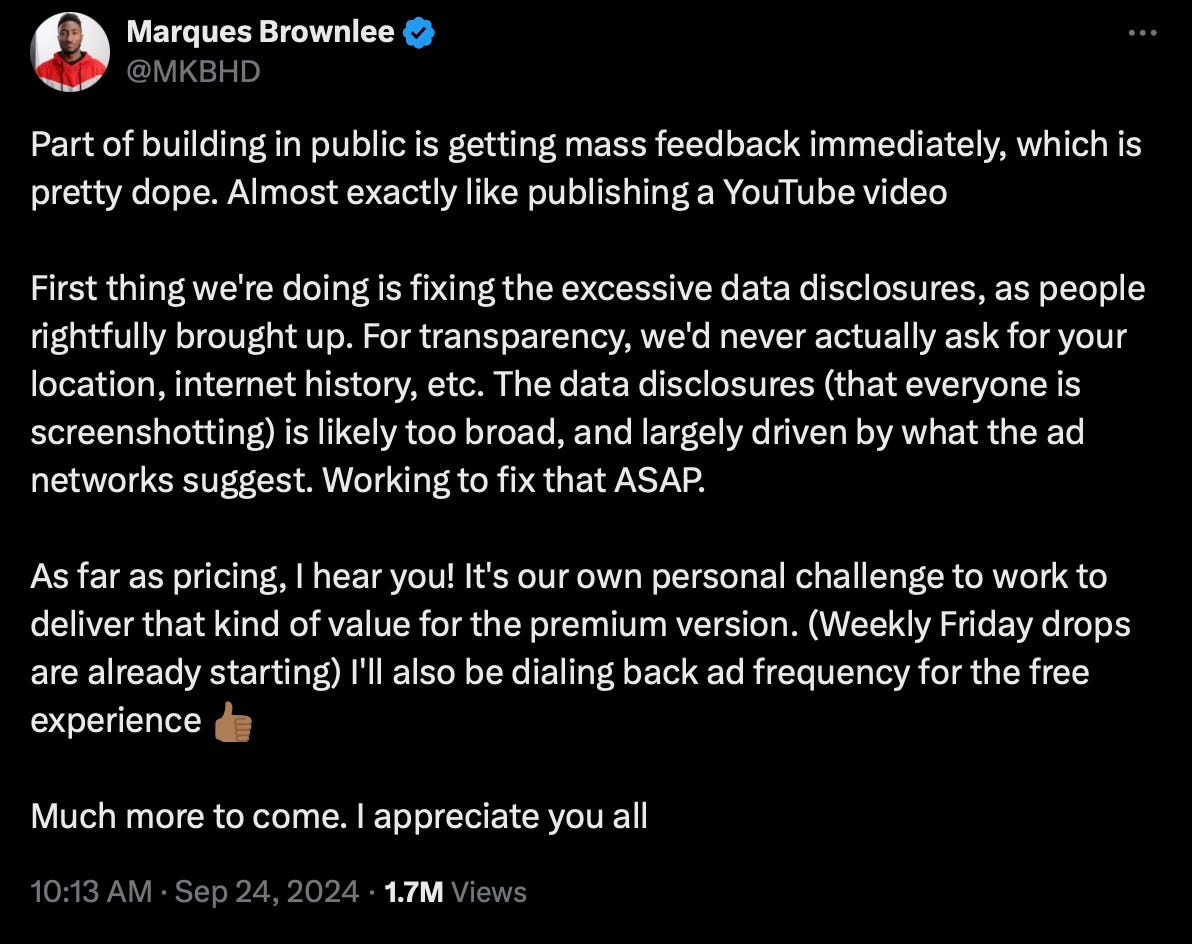Reviewing products doesn't teach you how to build them
Marques Brownlee (MKBHD) is one of the most popular tech reviewers in the world, and people have been suggesting he knows so much about products from reviewing them that he should build his own. Well, he just did so.
And it makes no sense.
His big product idea is the Panels wallpaper app for $49.99 a year. There is literally nothing in that sentence that makes a lick of product sense.
There is no market for wallpaper apps. iOS and Android come with several very good options. People can use their own photos as wallpapers and backgrounds (which phones are very good at taking these days). A user can literally download any cool-looking photo they see on the Web and use it as a wallpaper. Hell, you can ask AI to create all kinds of wacky and cool-looking wallpapers.
Beyond the lack of market, the pricing model is ridiculous. The small niche market there may be for wallpaper apps is not going to be one where people pay a lot of money upfront. The two options here are to make the app cheap, so why not a price of something like $1.99 a year ( or a buck a month if you want to be bold)? Go for the mass market and hope that people love the wallpapers you sell.
The other option is to make it free, and every wallpaper costs a set amount. These two pricing models would help a lot. As you can see from them, however, there is not a lot of money in this idea. I suppose you could make it free and ad-supported, but this suggests you believe that users look to change their wallpapers so frequently that they’ll view a bunch of ads. The economics of free, ad-supported require quite a volume of traffic.
The Panels app does let you get wallpapers for free by viewing ads to unlock low-res versions, but that sounds like a preposterous idea. I have to go the app store, download an app, watch an ad, and all I get for my trouble is a pixelated wallpaper?
This app idea seems to lack any sort of user, market, or product research to back it up. Understanding demand signals and how to find them are a crucial part of creating new products. Reviewing products won’t teach you any of these lessons.
In fact, reviewing products on YouTube and using social media to generate traffic can teach you a lot of bad lessons in how to build actual products. YouTube and social media encourage and reward controversy. They encourage clickbait headlines and images. None of these things will help you sell a product (but they may help you generate a lot of ad revenue).
Tech Journalists and reviewers have a lot of opinions. They often feel they get what makes a good product. But one of the things I have seen over the years is that they are often just wrong.
Brownlee’s response doesn’t offer a lot of hope for learning. Building in public doesn’t work if you don’t do the rigorous work to build something that people want. Building in public can be a good way to get additional feedback cycles and ignite a fire under the product development team to move quickly to fix issues, but building in public is a very poor way to find out what to build in the first place and how to position it in the market.
Because reviewers have never built a product and never done the research, prototyping, and testing, they have no idea what users actually want. A reviewer is a user of one. Even if you like or hate something, that doesn’t mean the market agrees with you at all.
I firmly believe that tech and product reviewing would be better if more of it were performed by people who have built and sold products and not by reviewers and journalists without experience. When I review products, I use a rubric to help guide me (a rubric based on my experience building products and in teaching human-computer interaction).
Here is what I would have done differently:
Market research to understand the market size and dynamics
User research to understand how users would want to interact with this product and what payment models worked for them
Prototyping and testing of several different options to get feedback on
If you don’t have the skills to do this, you can hire consultants to help you out.
A lot of people skip research, validation of market, prototyping, and testing because they cost money. But, guess what, building products is expensive. The research part of it saves you money in the long run. It also saves you from embarassing yourself.
Reviewing products teaches you how to be a critic. There is a market for all kinds of critics. People are willing to pay for critics or consume ads to pay for critics.
Being a critic doesn’t teach you how to build products. You can learn, but you won’t learn from reviewing products.
The Homer Simpson car is what happens when you let a layman build a product without any rigor.



